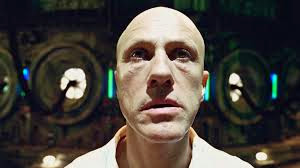The Zero Theorem
Mondo Spoilers!
At long last we have Terry Gilliam's THE ZERO THEOREM, the conclusion of his dystopian trilogy that began with 1985's BRAZIL and continued with 1996's 12 MONKEYS. I'd fostered some white hot anticipation for this movie, which I first learned about last year. It was clear from the stills and trailer that Gilliam was well within his element, back to the bleakness of a tech drenched landscape, a future the director has described as one not waiting for us to get to, but one that is coming at us. All filmed with those stretched angles and impossibly high ceilings.
Gilliam also states that he feels that past, present, and future are always evident and tangible, right now. Intermingling. He gives an example in his own day-to-day of holding a smartphone with one hand and cranking coffee beans with the other. While the setting of THE ZERO THEOREM is packed with gadgetry and technology suggesting a later decade, it all feels like it's already happening. Maybe a few degrees of immediacy off from Spike Jonze's HER.
Qohen Leth (Christoph Waltz) is a reclusive computer whiz stuck in a deadeningly repetitive job. He lands what seems to him a dream, if daunting, assignment: navigating a computer program that is designed to either prove or disprove the meaning of Life. A mathematical puzzle that with each scheduled upload will get its user closer to the Answer. Qohen has spent his own life in a fog, waiting for a phone call to explain it all. He indeed believes this will occur, as years before he was phoned in the middle of the night, a mysterious voice beginning to tell him what his purpose was, but was cut off. He has been waiting for a follow up call ever since. Now able to work at home, he will be sure not to miss it.
An individual known only as "Management" (Matt Damon), whose figure looms on posters around town that read EVERYTHING IS UNDER CONTROL, hand picks Qohen for this possibly inconclusive task, despite their brief, awkward sort of interview at a party at the home of Qohen's boss Joby (David Thewlis). Also at the party is a quirky blonde called Bainsley (Mélanie Thierry) who will begin a series of visits/interruptions at Qohen's domicile: a dank, cluttered former monastery that was burned beyond repair years before. He deadpans to visitors that the monks took their vow of silence so seriously as to not yell "Fire!".
For over a year Qohen plugs away at "The Neural Net Mancive" on his supercomputer to arrive at the "Zero Theorem", again and again coming a few percentage points short of his goal, for as the onscreen computerized lips repeatedly remind him: "One-hundred percent must equal zero." A maddening pursuit, precluding him from even going outside. He has repeated nightmares of the entire universe slipping into a black hole. His psych program "Dr. Shrink-Rom", with its artificial intelligence therapist (Tilda Swinton), is of little help. Qohen is at first suspicious of Bainsley's affections but begins to enjoy their trysts - albeit virtual reality trysts - sometimes on a manufactured beach. Has he finally made a connection?
Then a teenage computer genius called "Bob" (Lucas Hedges) arrives to inform Qohen of the truth of The Zero Theorem, that Bainsley may not in fact be what she seems, that Qohen is being watched every second. Through a camera atop the crucifix with the missing head, no less. The observer: Bob's father - Management.
I've only seen THE ZERO THEOREM once but it was certainly enough to spur inquiries long afterward. While Gilliam's themes may be very familiar and less dense than before (some critics have dubbed this film "BRAZIL's little brother"), this does not mean they are any less immediate. Has technology replaced religious faith? Is "the perfection of death messed up by the virus of life"?
Qohen repeatedly refers to himself not as "me" or "I", but "we", or "us." That is until the end, after a series of events lead him to what appears to be an eternal solitude. He rejects an offer of love. Bainsley's love, in the flesh, not merely a simulation. Is Gilliam (and screenwriter Pat Rushin) comparing this denial to a dismissal of faith? A reaffirmation of being "alone but not lonely."
When Qohen smashes every eye of surveillance he discovers in his house, every portal through which Management may watch and control him, has he forsaken God? No longer an "us." Has he not merely reconciled the comforts of solitude but also a truly independent state? A sinner who departed and never knew...? Within a computer, no less?
By the admittedly frustrating conclusion of THE ZERO THEOREM, after that last exchange with Management, does the viewer write off Gilliam's film as nihilistic? Defeatist? As Qohen directs the sun to finally set on that artificial ocean, has he (not "we") fully embraced free will? Has he disappeared down the black hole? These questions will haunt you long afterward if you let them. If you're a Gilliam fan, you should shell out a few bucks and catch this On Demand, now.



Comments